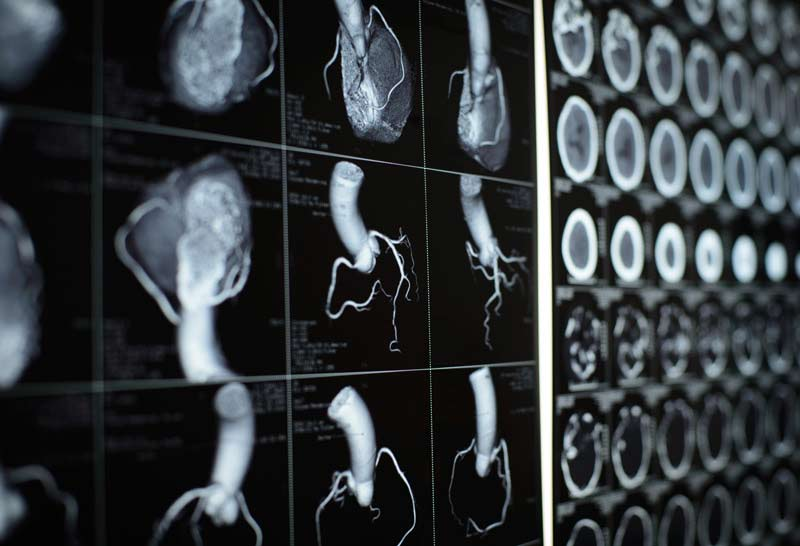A cardiac computed tomography (CT ) scan uses many X-rays from different angles to construct images of your heart using a scanner and computer. This quick but detailed and high-resolution scan shows your healthcare provider problems with your heart structure, valves, arteries, aorta and more.
Advertisement
Cleveland Clinic is a non-profit academic medical center. Advertising on our site helps support our mission. We do not endorse non-Cleveland Clinic products or services. Policy

A cardiac computed tomography (CT) scan is a procedure that utilizes multiple X-ray beams from different angles to acquire high-quality, three-dimensional (3D) images of your heart, along with your great vessels and surrounding structures.
Advertisement
Cleveland Clinic is a non-profit academic medical center. Advertising on our site helps support our mission. We do not endorse non-Cleveland Clinic products or services. Policy
Cardiac CT uses advanced CT technology, with or without intravenous (IV) contrast (dye) to better visualize your heart structure and associated blood vessels. With multi-slice scanning, your healthcare provider can get high-resolution, 3D images of your moving heart and great vessels.
Your healthcare provider will be able to see your:
A cardiac CT scan can give your healthcare provider more information and detail than other kinds of imaging. Your healthcare provider may want you to have a cardiac CT scan for various reasons, including:
Advertisement
Although your cardiologist (heart specialist) will most likely order your heart CT scan, a different healthcare team does the scan, including:
You’ll need to go to a hospital or a place that specializes in medical imaging to get the scan.
The scanner’s X-ray beam will circle around you but won’t touch you. You’ll hear the scanner buzz and click while it’s working. A computer puts multiple scans together to create 3D images of your heart.
Although a cardiac MRI and a cardiac CT both create detailed images of your heart in more than one dimension, the tests do have several differences, including:
On the day before and the day of your cardiac CT scan, you’ll need to follow instructions about what and when you can eat and drink, and if you should withhold certain medications.
Before your cardiac CT scan, your healthcare provider will want to know if you’re:
Advertisement
The entire cardiac CT scan may take 30 to 60 minutes, including preparation time. But the actual CT scan only takes 10 minutes at the most.
Advertisement
Once your healthcare provider is sure they have the images they need, they’ll remove your IV. You can change clothes and go home. You can go back to all normal activities and eat as usual after the test. If you took a sedative to relax, you’ll need someone to drive you home, though.
Your healthcare provider will discuss your test results with you that day or in a few days.
A CT scan is a low-risk procedure, but some people have problems with the dye or other substances the test uses.
Occasionally, people experience an adverse reaction to the contrast agent, which usually has iodine in it. Some people develop itching, nausea, sneezing or a rash after the injection. These symptoms usually go away without treatment, but antihistamines, steroids and histamine blockers can help.
Rarely, a more serious allergic reaction (an anaphylactic reaction) occurs that may result in breathing difficulty. You’ll need medications and treatment to reverse the symptoms of this potentially life-threatening reaction.
If you have diabetes or kidney disease, you may need extra fluids when you’re done with your scan. This’ll help you get the iodine out of your body.
Because the dye you get for a cardiac CT scan can get into your breast milk, you may want to prepare some before your scan to give your baby for a day or two after your scan.
Advertisement
CT scanners use X-rays. Radiation from these carries a small risk of cancer over time. For your safety, the amount of radiation exposure is kept to a minimum. However, because X-rays can harm a developing fetus, this procedure isn’t recommended if you’re pregnant. If you need to have a heart CT scan, your healthcare provider can take measures to protect your baby.
If you received medicine to slow your heart rate for the test and you have asthma, heart failure or chronic obstructive pulmonary disorder (COPD), you might have trouble breathing during your scan. It’s important to inform your healthcare provider if you have these conditions.
Contact your healthcare provider if you’re having a reaction to the dye or medicine you got during the test or if you haven’t received results from your heart CT scan after a few days.
A note from Cleveland Clinic
Don’t let a heart CT scan (or the CT machine) intimidate you. It’s a noninvasive test that gives your healthcare provider valuable information about what’s going on with your heart and associated structures. For the best results, follow your healthcare provider’s instructions about diet restrictions before the test and about lying still and holding your breath when asked.
Last reviewed on 02/28/2022.
Learn more about the Health Library and our editorial process.